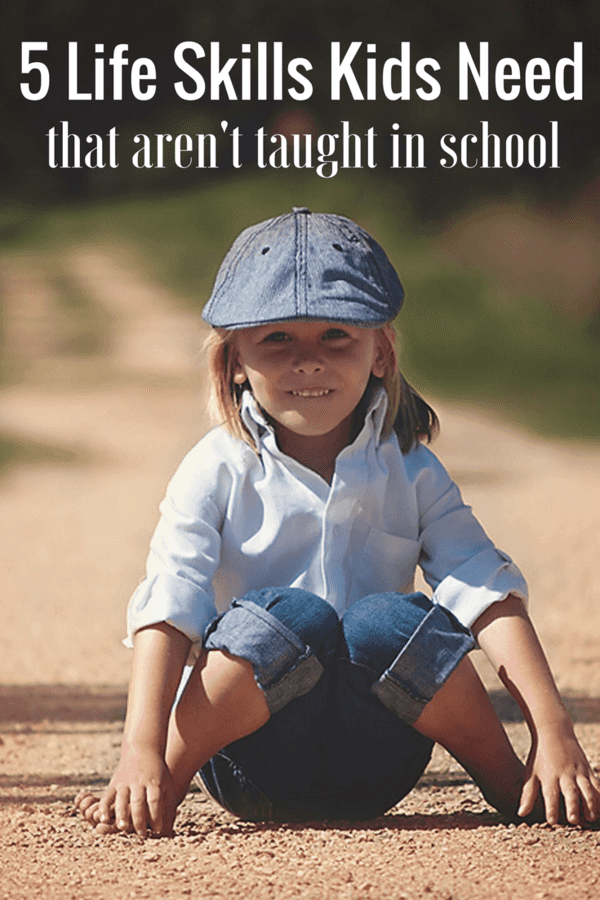
I think most of us want our kids to grow up happy and healthy, as people who give a positive contribution to society.
I’d also love to assume that most of us want our kids to gain enough independence to be self sufficient and be able to leave the house and live on their own quite productively. Although I am scared of my kids being out on their own, hopefully as a parent, I can entrust myself to be able to guide them to make that transition over the next 10-15 years.
Living on their own and being independent goes much farther than teaching them how to put away dishes and brush their teeth, vacuum the floor… it also requires them to be able to master those skills that aren’t taught in the confines of the school walls.
Public and private school classrooms are so focused on preparing kids academically that life skills get shoved to the side – combined with parents who feel like they can’t freely ‘parent’ without having to always worry about their kids safety doesn’t allow our kid much room to really learn things for themselves. Helicopter parents are everywhere, and sometimes free range parents are misinterpreted as uncaring, and too willing to freely entrust their kids.
We have kids who are in college that can’t do their own laundry, who don’t know how to cook for themselves, and are unable to manage their money.
Being an adult requires them to be independent, self sufficient, free thinking, and money savvy – it also requires them to have the street smarts they need to know what should or shouldn’t be done at any given time.
Here are 5 basic life skills that every child needs to learn:
#1 – Earning Money
Money is one of the most important areas of learning how to be self sufficient and independent. And before kids can learn how to effectively manage their money, they need to learn how to earn money.
Earning money goes far beyond dollars they might get from grandparents, family and friends for their birthday or perhaps even a holiday.
Earning money represents what they have learned from their own efforts.
While some chores should be expected .. allow your kids to earn money for additional tasks that they complete. Give them the opportunity to earn per task or a weekly stipend for a collective group of tasks.
Having that chance to earn money may drive them to learn how to manage their earnings – a portion to save, a portion to tithe, and a portion to spend. Allow them to learn how to document their earnings, and go with them to open up a basic savings (in addition to anything you may have for them like a college fund), so that they can establish the habit of depositing their earnings each month.
Having the chance to earn an income has allowed our kids the chance to learn how money works and given them the opportunity to use and budget their money for things they want or need.
#2 – Managing Money
Whew, probably one of the most important things we can teach them is to how to handle money.
Kids learn their spending habits from their parents, not work or school.
What we model as adults and parents determines what our children pick up from us and carry forward.
Our kids need to understand basic behavior – and we want to teach children how money works in the real world.
Our kids soak up everything like a sponge – from spending money carelessly to paying with a debit card, financing products that we think we need but may not be able to afford to frivolously spending here and there each day as we peruse around town.
Kids might not understand the transfer of money, therefore it may seem like the swipe of a card gets them “all this stuff” – you and I both know that’s not really how it works. Our older children have probably inferred that this is not the reality, but our younger kids don’t realize that at all.
It’s important to talk to them about effectively managing the money they earn – focusing on wants vs. needs, comparisons, establishing a budget and the financial implications of even the most minor spending.
Our kids don’t always need to see us spending – they also need to see us saving money.
They need to see us saving for things we need, and the things that we want. They also need to see us planning those long term savings goals – saving for a trip next year, saving towards their college fund, and systematically contributing to a regular emergency fund on a monthly basis.
Managing money encompasses so many areas – handling debt, understanding comparison behavior, saving for the now and later, retirement planning and every day purchases. Being able to allow your kids to learn about these areas through every day life lessons are invaluable as they grow older.
#3 – Basic Cooking Skills
There is definitely nothing wrong with eating out… but doing so responsibly when it’s in your budget. Eating out because you are too lazy to learn how to cook basic items is another story.
Believe it or not…. millennials are spending more of their food budget on dining out than ever before. Millennials spend 44% of their food dollars – or $2,921 annually – on eating out, according to Forbes.com.
So many kids get to college and lack the basic skills that they need and feel like eating out the only option. Or, eating is more convenient, perhaps they associate eating at home with a myriad of pots and pans, dishes and complex foods. That’s not always the case either.
Unless you really want to make 2 hour meals, it’s not really the norm for most of us.
Unfortunately we do them a huge disservice by not teaching them the basic cooking skills.
And while it might seem easy to crack open a pizza, box, or heat up food in the microwave, those aren’t the type of basic cooking skills that we’re talking about. Teach them how to have a relationship with the food that they eat, the food that they will be feeding their family with trips to the Farmers Market, investing in a local CSA, and formulating meal plans around the vegetables they are able to get that week.
Let them learn how to prepare basic food like homemade bread, fresh cheese, and basic skills like making eggs, sharpening knives, and preparing real food meals.
I don’t know about your kids, but my kids take a great deal of pride in food that real food is made from ingredients in the kitchen, and not from a box, or bag sold on a store shelf.
#4 – Practical Life Knowledge (often called “Street Smarts”)
We would only hope that as our kids get older, they develop a sense of knowing between what does or doesn’t feel right in any given situation but sometimes they don’t.
Kids need to develop street smarts… but street smarts aren’t something that can’t be taught. At least consciously.
The best way to teach your kids anything is to do it yourself. Be street smart – and allow them to learn from you. Let them do things that will help them learn on their own. Children are smart – they will not take on challenges that they may not be ready for.
Seeing you confident in their ability will give them confidence. Exposing your kids to as many people and experiences as you can will help them see and experience a wide range of people, and situations. Street smarts can only be attained through passive learning – it’s not something that you learned consciously – right?
At least it’s not something that we learned consciously – we learned this through our own personal experiences.
The only way to help them develop this practical knowledge is to do everything you possibly can to avoid sheltering your kids while at the same time providing a loving and nurturing environment in which they can learn.
#5 – Caring for their House and Belongings
Common things we do daily as adults are important to help our kids learn how to do effectively – things like sorting and caring for laundry, simple sorting, hanging clothes and putting clothes away properly.
As children get older they can start with more complex issues – washing delicates, fixing small repairs, and treating stains.
While these seem like such easy things to us as adults, they are basic things that every child will nee to know to be able to handle doing laundry in their own home, and at some point, for their own family. There really isn’t a “perfect” age to start teaching your kids – each of ours has their own responsibilities given their age and are expected to handle those responsibilities on an as needed basis (pretty much each day).
Caring for their house and belongings goes far beyond laundry though – it includes some of the basic household maintenance tasks like changing out light bulbs, working with water heater issues, and treating issues with the sink, garbage disposal and even air conditioning.
What do you think the most important life skills are for kids? Do you agree with any of these?




Leave a Reply
You must be logged in to post a comment.